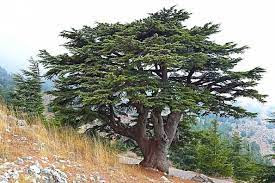M |
INE eye also shall see my desire on mine enemies, and mine ears shall hear my desire of the wicked that rise up against me. 12 The righteous shall flourish like the palm tree: he shall grow like a cedar in Lebanon. 13 Those that be planted in the house of the Lord shall flourish in the courts of our God. 14 They shall still bring forth fruit in old age; they shall be fat and flourishing; 15 To shew that the Lord is upright: he is my rock, and there is no unrighteousness in him. (Psalm 92:11-15)
The Bible often refers to trees in various metaphoric ways. For example, in Eden, there were two designated trees that represented obedience to God (the Tree of Life), or sinful disobedience (the Tree of the Knowledge of Good and Evil). Trees also are represented as revealing the moral proclivities of peoples and nations as when Jotham rebuked Abimelech before the people of Shechem in Judges 9:7-21. The palm tree, also, alludes to fruitfulness even in a wilderness place such as the caravanserai which usually was located in small oases along trade routes of the middle east. These were characterized by palm trees whose root systems are far greater than their visible countenances. The righteous shall flourish like the palm tree.
A man blessed of God who walks in righteousness is also likened to a tree that sinks its roots deep into the banks of the rivers of life whose leaf never withers. And he shall be like a tree planted by the rivers of water, that bringeth forth his fruit in his season; his leaf also shall not wither; and whatsoever he doeth shall prosper.(Psalm 1:3) That ground is a good heart whose source of sustenance is the deep waters of the Word of God. It remains unchanging in righteousness just as God is unchanging in His mighty will for he honoureth them that fear the LORD. He that sweareth to his own hurt, and changeth not. (Psalm 15:4)
There is another tree, distinct from those mentioned, that is used most often in the Scriptures to denote strong character and uprightness. That tree is the Cedrus Libani, or Cedar of Lebanon. This tree is tall and stately reaching a height of 120 feet. It is an evergreen tree indicating the unchanging character of a good man or woman or loyalty in friendship. It is not a pretentious tree – its limbs are not widely deployed, but adhere closely to its trunk from top to bottom. Its wood and oils are decay and pest resistant. My mother used trunks to store seasonal apparel made of this cedar wood to protect against moths and other insects. This also compares with the character of the devout Christian whose serious faithfulness to God’s Word protects against even the subtle suggestions of the wicked.
The Cedar of Lebanon is able to sustain drought since its roots are deep, and high wind conditions owing to its slender profile. So can the man or woman of conviction stand against the changing winds of the social environment and the sudden changes in fads and fashions to which they are not drawn.
The Cedars of Lebanon define the Christian for their steadfastness, moral might, and upright stature. The wood from these trees was used in the building of the Temple and the Palaces of Solomon. There is one power that will break the Cedars of Lebanon and bend them according to the right way – The voice of the LORD breaketh the cedars; yea, the LORD breaketh the cedars of Lebanon. (Psalm 29:5) His prevailing Voice above those of the world will turn the righteous back from the Broad Way that leads to destruction.
The Cedar of Lebanon possesses an inner strength that may not readily appear to the casual observer of the world. The trees of the LORD are full of sap; the cedars of Lebanon, which he hath planted. (Psalm 104:16) They are particularly suited for much sunlight as is the Christian to the Light of the World. These trees also give off an aromatic fragrance that is clean and wholesome – just like the character of the Christian believer whose character is guided by God’s Word.
The Cedar of Lebanon finds its favorite habitat on mountain slopes and higher ground much as the life of a Christian. In the mountain of the height of Israel will I plant it: and it shall bring forth boughs, and bear fruit, and be a goodly cedar: and under it shall dwell all fowl of every wing; in the shadow of the branches thereof shall they dwell. (Ezek 17:23)
Perhaps it is time for some self-examination as to what nature of tree we may be – a cedar, an oak, an olive, a fig; or perhaps a thornbush, or crabapple. Our tree-type will reflect our natures as Christian men and women of faith.




